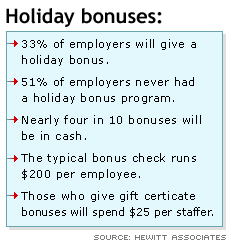New York (CNN/Money) – A few weeks ago, employees at the health-care benefits company, Vision Service Plan, were tracked down for a very pressing matter of business: it was time to distribute their holiday bonuses.
Specifically, the Sacramento, California-based company gave 1,700 of its employees (excluding managers) checks equivalent to a week's pay and a box of chocolate. The pay, worth about 2 percent of employees' salaries, cost VSP about $1 million, plus another $18,000 for the chocolate.
If the company meets annual performance and budget goals, all employees will receive additional bonus money in February -- usually worth another week's pay.
"It's a good thing to do at this time of the year," explained VSP CEO Roger Valine. "Even the candy, as simple as that seems, has a big impact. It says we appreciate the employees - not only the work they do, but we also appreciate the need to balance their lives with their family."

He notes such bonus plans have a "significant impact" on employee morale.
But such savvy corporate strategizing isn't the norm these days. In fact, VSP is among only 33 percent of companies this year that will hand out holiday bonuses or gifts to employees, according to a recent study by Hewitt Associates.
And employees who are used to bonuses shouldn't be surprised if they receive less than they have in the past. One study by Watson Wyatt found that 21 percent of companies have eliminated or significantly slashed their incentive-bonus programs.
"Holiday bonuses used to be very common. But the trend has been away from them," said Laura Sejen, of Watson Wyatt. "There's a need to manage costs."
Bonuses - your company may need them more than you
Some employers are more committed to bonus programs than others.
| More holiday stories
|

|
|
|
|
Small businesses, in particular, tend to give holiday bonuses as a way to engender team work, says Sejen. In fact, one study by American Express found that 46 percent of small business owners will give bonuses this year.
Jeanne Achille will be among them. The founder of a small public relations firm, The Devon Group, in Shrewsbury, NJ, Achille started handing out holiday bonuses in 1995, the first year she started her company. And while some years may be more profitable than others, Achille says her firm will continue to give bonuses "come hell or high water."
Her reason? Achille is determined to retain talented staffers, whom she calls the company's "greatest assets." Every one of her 15 employees can count on getting a yearly check, based on corporate profitability and their own contributions to the cause. It's a kind of all-inclusive giving that flies in the face of traditional incentive, or performance-based programs, where only a select group of employees are eligible for a bonus.
Incentive pay outs are generally much richer for top-level executives than rank-and-file employees, whose bonuses now average 3 percent of their base pay, according to Mercer Human Resource Consulting. (Professionals and technical staff will get 8 percent of pay on average, while managers' bonuses will typically be equivalent to15 percent of salary. Executive bonuses may be as much as 29 percent of pay.)
When times are flush, some professionals, such as stock brokers and lawyers, can count on even more. But this year, holiday bonuses at big New York law firms are running 50 percent less than they have in the past since firms aren't making as much money. They're still likely to bring home bonuses of $15,000 to $35,000, depending on how long they've been out of law school.
Even with the depressed economy, " some of these 20-something's are getting more in bonuses than many people earn in a year," said Stephen Gillers, vice dean of the New York University School of Law.
And for those not getting cash
Of course, bonuses tend to be – but aren't always – cash, especially if they're given more as a holiday gift than a reward for superlative work. Of those companies that give holiday bonuses, 39 percent dole out cash gifts, while 36 percent distribute gift certificates. Another 28 percent of employees who receive a holiday bonus, will get a turkey, ham or some other food product, according to Hewitt.
Others, including CNL Bank in Orlando, make charitable contributions on behalf of employees or offer employees paid time off.
That said, firms that have the most popular gift programs have wizened up to the fact that mugs adorned with a company logo – or any other gift emblazoned with the corporate I. D. – don't make great bonuses.
Instead, they'll put the company insignia on the gift wrapping, but the message is to make the gift as personal as possible, said David Goggin, president of DBG Promotions in Winter Park, FL, a firm that creates gift and incentive programs for companies nationwide.
"The hot gifts this year are crystal highball glass sets with individual's initials on them. Or a watch that has the company name on the back of it so employees don't feel like they're an advertisement for their company," said Goggin.

|

